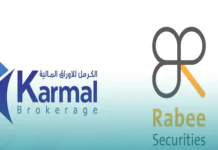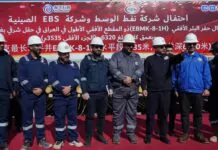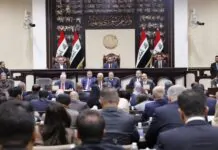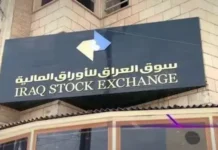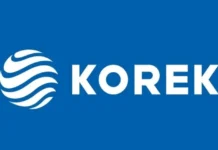Iraq And Nine Other Arab Countries Possess Approximately 1,500 Tons Of Gold Reserves.
Money and Business Economy News – Follow-up The World Gold Council announced on Monday that Iraq and nine other Arab countries possess approximately 1,500 tons of gold reserves in the world.
The council said in its latest table for November that “ten Arab countries, including Iraq, possess 1,498 tons of gold.”
He added that “the top five Arab countries, namely Saudi Arabia, Lebanon, Algeria, Iraq and Libya, possess 1,101 tons, while the remaining countries, namely Egypt, Qatar, Kuwait and Jordan, possess 397 tons.”
The council noted that “Iraq raised its gold reserves to 171.9 tons last August, after it was 162.7 tons in July, thus maintaining its 29th place globally out of 100 countries listed in the table with the largest gold reserves.”
It is worth noting that the World Gold Council, headquartered in the United Kingdom, possesses extensive experience and in-depth knowledge of the factors influencing market changes, and its members include the world’s largest and most advanced gold mining companies. https://economy-news.net/content.php?id=62163
Gold Prices Are Rising Again In Iraqi Markets Today.
Economy | 03:00 – 10/11/2025 Mawazin News – Baghdad: Prices of both foreign and Iraqi gold have risen in local markets in the capital, Baghdad. The selling price of one mithqal (approximately 4.5 grams) of 21-karat Iraqi gold reached 780,000 dinars, while the buying price was 775,000 dinars. The selling price of one mithqal in goldsmith shops ranged between 810,000 and 820,000 dinars for Gulf gold. https://www.mawazin.net/Details.aspx?jimare=270074
The President Of The Republic: Active And Broad Participation In The Elections Is Our Only Way To Correct Mistakes
Baratha News Agency1212025-11-10 President Abdel Latif Jamal Rashid affirmed on Monday (November 10, 2025) that the country is on the cusp of a new and important phase in the path of consolidating peace and stability and achieving development, noting that holding legislative elections represents a confirmation of the commitment to constitutional democratic political life.
President Rashid said in a speech on the occasion of the sixth legislative elections that “our people have proven that they are worthy of continuing their civilizational achievements, and have presented a democratic model of coexistence among its various components,” stressing that “effective and broad participation in the elections is the only way to correct mistakes, address shortcomings and develop the political system.”
He added that “electing is a national right and duty, and the Presidency has worked to support all parties concerned with implementing this entitlement,” calling on voters to “look realistically, honestly and faithfully when choosing candidates for membership in the House of Representatives, who will be the watchful eye on protecting the rights and interests of the people.”
The President affirmed “working to support the upcoming House of Representatives in enacting important laws that activate the articles of the Constitution, in order to complete the institutional building of the state.” https://burathanews.com/arabic/news/467523
Legislative Elections Are A Political Guarantee For Economic Growth And Stability.
Dr. Haitham Hamid Mutlaq Al-Mansour Economy News — Baghdad Legislative elections in Iraq are a pivotal part of the political process, as they are the legal and legitimate link that ensures the peaceful transfer and transformation of power and works to achieve the necessary prerequisites and basic requirements for the process of building the state in all its parts and the proper growth of society.
The impact of elections on the economy is tangible, but indirect, by conferring legitimacy on the government resulting from elections with strong public approval and legislative parliamentary consensus, from which it derives the necessary legitimacy to make crucial reform decisions, such as reducing subsidies, restructuring the public sector, stimulating the private sector, reducing rent-seeking, and expanding sources of income or GDP.
However, weak voter turnout in elections undermines this legitimacy and reflects a loss of confidence in ruling parties and elites. Framing political conflict rather than resolving it often leads elections to redistribute power among political elites (a recalibration of power) instead of bringing about change or improvement in the landscape of achievement.
This is compounded by the stagnation of the existing political system, which creates fragile alliances that hinder the formation of governments incapable of implementing a long-term strategic vision for economic reform.
The electoral programs presented by political parties and blocs largely lack clear funding frameworks and specific implementation mechanisms. Furthermore, promises to create jobs and combat corruption are likely to remain mere slogans in the absence of realistic financial plans and measurable performance indicators.
However, with the growing political activism, the continued practice of political experimentation, and the clear improvement in the government’s performance in providing essential services and completing a significant portion of important projects—despite numerous shortcomings—optimism prevails that the electoral competition between political parties and blocs of all stripes and orientations could produce a bloc capable of reforming the government.
This bloc would undertake the task of advancing the country and building upon past achievements by embracing the requirements of the transition towards development and investment.
This would transform elections from mere political representation into a genuine catalyst for stability and economic growth, through a commitment to implementing several key elements of the state’s policy and government program.
1. Political Will to Combat Corruption: The incoming government must possess the political will to confront the entrenched corruption networks within state institutions. This requires strengthening oversight bodies such as the Integrity Commission and the Financial Control Bureau, granting them greater executive powers.
It also necessitates working towards the success of systems like the Integrated Financial Management Information System (IFMIS), which ensures transparent and auditable financial operations.
2. Structural reform of the economy: There must be a serious shift from a rentier, oil-dependent economy to a diversified one. This requires redirecting public spending from current consumption to investment in infrastructure projects that stimulate the private sector.
3. Active community participation and oversight: Sustained pressure from citizens, independent media, and civil society organizations can play a pivotal role in holding the government accountable and demanding transparency. Demanding the publication of contracts and monitoring project budgets can prevent the waste of public funds.
To ensure that the elections produce a government capable of leading economic development, its policies must focus on building strong and stable institutions by concentrating on the following steps:
1. Reforming the legislative framework: Iraq needs to adopt a “sound legislation” approach to ensure that laws are coherent, enforceable, and meet the real economic needs of society. Laws should focus on promoting transparency, combating corruption, and protecting property rights.
2. Structural reform of the economy: The primary objective is to transition from an oil-dependent economy to a diversified economy. This requires a national plan to develop non-oil sectors such as agriculture, industry, trade, tourism, and services.
3. Stimulating the private sector and investment: This can be achieved by building a policy to support procedures for opening companies, reducing taxes on new and productive investments, and providing credit facilities for small and medium enterprises.
4. Public Finance Reform: Restructuring government spending to reduce current expenditures and increase the share of investment spending in infrastructure, education, health, and other sectors that would create a solid foundation for long-term growth. Working towards harmonious formulation of fiscal and monetary policies to reduce overlap and minimize the negative effects of their intersection, and even unifying fiscal objectives and striving for a common economic vision between them.
In short, parliamentary elections are a necessary but not sufficient condition for achieving economic stability in Iraq. They represent a window of opportunity for change, but the real guarantee lies in changing the political rules that govern the equation, building a national consensus on a long-term reform program, and creating a new relationship based on transparency between citizens and the government.https://economy-news.net/content.php?id=62145
A US Convoy Of More Than 200 Trucks Arrives In Western Anbar
Security | 03:08 – 10/11/2025 Mawazin News – Anbar: A source in Anbar province revealed that more than 200 American trucks loaded with equipment and caravans have arrived in the western part of the province as part of preparations to develop the Akkas gas field and several other oil sites in the western desert.
The source stated that “trucks belonging to the American energy company Schlumberger arrived at the Akkas gas field site in the Qaim district of western Anbar.”
He added that “an American airborne force conducted surveys of oil and gas fields in the western Anbar desert without prior knowledge of the local government,” noting that “a number of American energy companies have also arrived at Ain al-Assad Air Base in the al-Baghdadi area of the Hit district, in preparation for commencing their work in the region.”
The source explained that “these recent movements are part of a plan to develop the Akkas gas field, along with several other undeveloped fields in the western desert.” https://www.mawazin.net/Details.aspx?jimare=270076
Oil Rises Amid Moves To End Historic US Government Shutdowny
Economy | 09:11 – 10/11/2025 Mawazin News – Follow-up: The US Senate is moving toward a vote to reopen the federal government, and oil prices have risen amid optimism that the historic government shutdown, now in its 40th day, will end.
Oil prices climbed on hopes that the US government shutdown could end soon and boost demand in the world’s largest oil consumer, offsetting concerns about rising global supplies.
Brent crude futures rose 47 cents, or 0.74 percent, to $64.10 a barrel, while US West Texas Intermediate crude futures reached $60.25 a barrel, up 50 cents, or 0.84 percent.
Ending the historic US government shutdown, now in its 40th day, is within reach as the Senate moved toward a vote on reopening the federal government on Sunday. https://www.mawazin.net/Details.aspx?jimare=270045
For current and reliable Iraqi news please visit: https://www.bondladyscorner.com

